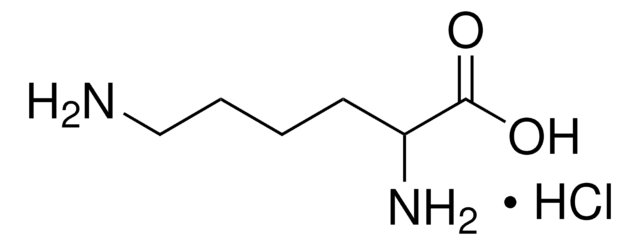L5876
D-Lysine monohydrochloride
≥98% (TLC)
Synonym(s):
(R)-2,6-Diaminohexanoic acid monohydrochloride
About This Item
Recommended Products
Assay
≥98% (TLC)
form
powder
color
white to off-white
mp
266 °C (dec.) (lit.)
solubility
H2O: soluble
application(s)
peptide synthesis
SMILES string
Cl[H].NCCCC[C@@H](N)C(O)=O
InChI
1S/C6H14N2O2.ClH/c7-4-2-1-3-5(8)6(9)10;/h5H,1-4,7-8H2,(H,9,10);1H/t5-;/m1./s1
InChI key
BVHLGVCQOALMSV-NUBCRITNSA-N
Looking for similar products? Visit Product Comparison Guide
Application
related product
Storage Class Code
13 - Non Combustible Solids
WGK
WGK 3
Flash Point(F)
Not applicable
Flash Point(C)
Not applicable
Personal Protective Equipment
Regulatory Listings
Regulatory Listings are mainly provided for chemical products. Only limited information can be provided here for non-chemical products. No entry means none of the components are listed. It is the user’s obligation to ensure the safe and legal use of the product.
JAN Code
L5876-BULK:
L5876-25G:
L5876-500MG:
L5876-1G:
L5876-5G:
L5876-10G:
L5876-VAR:
Certificates of Analysis (COA)
Search for Certificates of Analysis (COA) by entering the products Lot/Batch Number. Lot and Batch Numbers can be found on a product’s label following the words ‘Lot’ or ‘Batch’.
Already Own This Product?
Find documentation for the products that you have recently purchased in the Document Library.
Our team of scientists has experience in all areas of research including Life Science, Material Science, Chemical Synthesis, Chromatography, Analytical and many others.
Contact Technical Service








